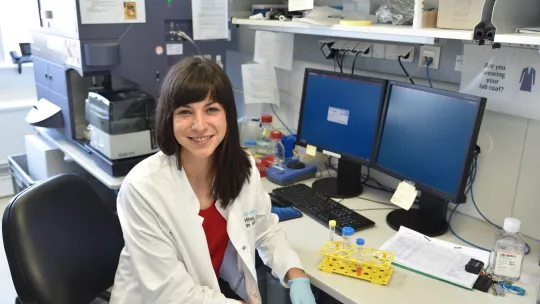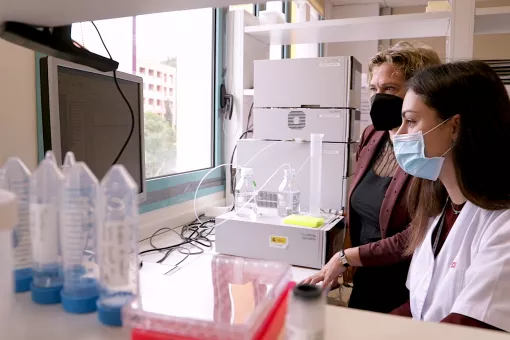Images
The collaboration aims to identify novel oral therapies for immune-inflammatory skin diseases with high unmet medical needs using a novel therapeutic modality called molecular glue degraders.
Molecular glue degraders could represent an opportunity to expand the scope of druggable targets with small, drug-like molecules that can reprogram natural cellular mechanisms to selectively remove disease-driving proteins from human tissues.
Almirall, S.A. (ALM), a global biopharmaceutical company focused on skin health, and IRB Barcelona (the Institute for Research in Biomedicine), an independent, international research centre engaged in fundamental and applied biomedical science, announced today a research collaboration to identify new oral treatments for immune-inflammatory skin diseases with remaining high unmet medical needs using molecular glue degraders, a novel therapeutic modality. These monovalent degraders offer a new avenue to induce the degradation of potentially disease-causing proteins that cannot be targeted with conventional therapeutic agents.
The collaboration brings together Almirall’s scientific, dermatological, and data analysis knowledge with the expertise of the IRB Barcelona’s Targeted Protein Degradation and Drug Discovery lab, led by Dr. Cristina Mayor-Ruiz. Recently awarded with an ERC Starting Grant, Dr. Mayor-Ruiz is a reputed expert on targeted protein degradation and pioneer investigator in the areas of the rational screening of molecular glues as well as the elucidation of their mechanism of action. Through this partnership, Almirall is expanding its toolbox of Targeted Protein Degradation approaches by entering the field of molecular glues.
Almirall scientists have identified several proteins whose abnormal function is associated with inflammatory immune skin diseases. However, many of these potentially therapeutically relevant proteins are not amenable to conventional small-molecule inhibitors, as they lack defined ligand-binding pockets. Molecular glue degraders can harness and reprogram natural cellular mechanisms to selectively remove those disease-driving proteins from human tissues. They can do so by promoting interactions ("gluing") between these therapeutically relevant proteins and the machinery used by cells to naturally tag and destroy proteins.
"This exciting collaboration underlines Almirall's R&D commitment to provide innovative treatment options to patients suffering from severe skin diseases. It also builds on complementary core expertise of each partner to facilitate research and drug development. We are eager to start working with Dr. Cristina Mayor-Ruiz’s group in the development of molecular glue therapeutic and are convinced that this partnership has the potential to address unmet needs in dermatological diseases.", states Dr. Thomas Huber, Head of Research at Almirall.
“We are very excited about this collaboration with Almirall. It's an amazing opportunity to put their knowledge and experience in dermatology, together with our expertise in molecular glues to accelerate drug discovery to treat skin diseases. The biochemical characteristics of molecular glues make them suitable candidates, and this innovative approach could really mark a turning point in dermatological pharmacology. So much looking forward to making this vision a reality together with Almirall´s fantastic team”, explains Dr. Cristina Mayor-Ruiz, Ph.D., Junior Group Leader at IRB Barcelona
Over the past year, Almirall has established strategic collaborations to accelerate the discovery and development of new therapies in Medical Dermatology. Examples of these agreements are the partnership with BIOMAP, the first dermatology project of the European Innovative Medicines Initiative (IMI), to advance the field of psoriasis and atopic dermatitis, and the collaboration with the University of Dundee, which will bring with it the opportunity to develop new therapies based on Proteolysis Targeted Chimeras, another type of targeted protein degraders.
About IRB Barcelona
The Institute for Research in Biomedicine (IRB Barcelona) pursues a society free of disease. To this end, it conducts multidisciplinary research of excellence to cure cancer and other diseases linked to ageing. It establishes technology transfer agreements with the pharmaceutical industry and major hospitals to bring research results closer to society, and organises a range of science outreach activities to engage the public in an open dialogue. IRB Barcelona is an international centre that hosts 400 researchers and more than 30 nationalities. Recognised as a Severo Ochoa Centre of Excellence since 2011, IRB Barcelona is a CERCA centre and member of the Barcelona Institute of Science and Technology (BIST).






